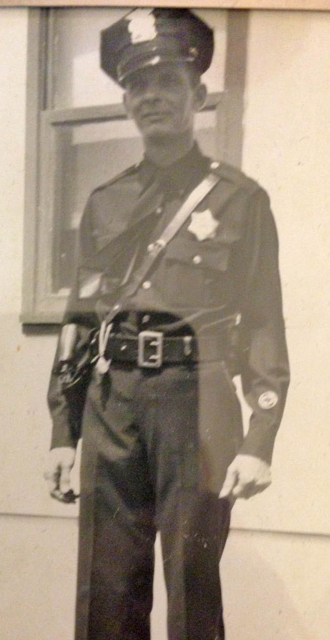Dallas Police Officer G.M. “Tip” Tippit, a Lake Highlands resident, was off duty on Nov. 22, 1963. As tragic events — the assassinations of President John F. Kennedy and police officer J.D. Tippit by Lee Harvey Oswald — unfolded, many, even Oswald’s eventual killer Jack Ruby, erroneously assumed G.M. was the slain Officer Tippit. With the rest of the world, Tip was devastated by the killings. “He was an ol’ country boy, like myself,” Tip says of J.D. But in days and years to come, J.D. Tippit’s slaying would uniquely impact Tip’s life.
Early aftermath
“I was working in the garage when I heard that Kennedy had been shot,” Tip recalls. “I just turned my garage radio on and listened.”
As news of the president’s and later J.D. Tippit’s death was broadcast around the nation, reporters looking for an angle began calling Tip’s home; they mistook him for his fallen associate with the same last name.
“The phone rang for three days solid after Tippit was killed,” Tip recalls. Tip also knew Jack Ruby, the nightclub owner who shot and killed Lee Harvey Oswald — at the time Oswald was in police custody and was suspected of killing both the president and Officer Tippit.
Ruby, too, based on official documents, mistook Tip for J.D.
In the Warren Commission Report, the investigation into Kennedy’s assassination, Tip is mentioned on page 262:
“Early Friday afternoon, Nov. 22, Ruby remarked how he knew Tippit, the officer who had been shot by Oswald. Later Ruby stated that he did not know J.D. Tippit but that his reference was to G.M. Tippit, a member of the special services bureau of the Dallas Police Department who had visited Ruby establishments during the course of his official duties.”
Written off, then reunited
Tip grew up on a farm with his grandparents — was raised on a horse, he says — and had herded cattle since he was 9 years old.
He attended Royce City High and moved in with his mother and stepfather, whom he loved immensely.
“He treated me like I belonged to him,” Tip recalls.
Even 70 years later, talking about his stepdad causes Tip’s voice to crack.
The Navy sent Tip to engineering school, where he focused on the internal combustion engine used in World War II ships, and then all over the Pacific. Assigned to a Landing Ship Medium (LSM) 312, he remembers making practice runs onto the beaches of the Philippines before facing real battle. After surviving combat, he worked on “just about every ship built by Brown Shipbuilding,” a major ship supplier during WWII.
Tip’s Navy crew gathered for annual reunions, but it wasn’t until 2000 that Tip attended one. His World War II comrades thought he was dead, Tip says, so he never was invited. “I had to search them out,” Tip says.
Armed with 21st century technology, he finally did.
“When they found out I was alive, when they saw me, they just bawled. Some who hadn’t been to a reunion in years came just to see me.”
Career as a police officer
Tip didn’t join the police force until he was 30 and decided he needed a career with a future. He patrolled until 1955, he says, after which he became a detective and spent 16 years as a narcotics officer.
He recounts a drug bust during which he shouldered down a front door, slid across the floor of an apartment, and landed at the feet of a waitress he and his partner knew from a local diner. “She was buck naked.” It turned out to be a big case, he notes seriously once his laughter subsides.
His final charge with the Dallas Police involved overseeing the helicopter division. A licensed pilot, he did fly sometimes, he says, but he primarily managed the new police helicopter fleet. “I was in charge of buying our first Bell Helicopter,” he says.
Being 94
“B-12! N-33!” Tip announces. At the Whiterock Court retirement community, where Tip lives today, he continues to command attention. He is in charge of calling the numbers during the thrice-weekly Bingo tournaments, and after dinner, a certain magic happens when Tip pulls his rusty M. Hohner harmonica from his pocket.
“It’s 80 years old,” he says. “Old and beat-up like me,” he quips before lifting it to his lips to play “When the Saints Go Marching In.” Nightly, he attracts a sing-along audience, says Libba Byrne, who works at the residences.
“It is fun and I enjoy it, and people seem to enjoy my playing,” Tip says.
Sometimes he feels down, he admits. “But then I grab myself and shake myself out of it,” he says.
Life, even as a nonagenarian, can be an adventure.
“At Christmas we take a little trip around White Rock Lake to look at the lights. It is something to see.”
This Christmas Day will be his 95th birthday.
Last year, Tip attended the dedication of a memorial marker honoring J.D. Tippit. Tip sat beside his friend Jim Leavelle, the homicide detective who was escorting Oswald when Jack Ruby shot him.
Sure, he says, he longs for some of the people and things now gone. He sometimes wishes things had gone differently or that he could renew severed relationships. But the way you feel, he says, “It is in your head. I am going to make the most of being alive.”







